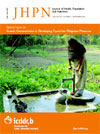
|
The Journal of Health, Population and Nutrition
icddr,b
ISSN: 1606-0997
EISSN: 1606-0997
Vol. 23, No. 4, 2005, pp. 331-338
|
 Bioline Code: hn05044
Bioline Code: hn05044
Full paper language: English
Document type: Research Article
Document available free of charge
|
|
|
The Journal of Health, Population and Nutrition, Vol. 23, No. 4, 2005, pp. 331-338
| en |
Corticosteroid-responsive Enteropathy of Infancy
Lichtman, Steven N.; Freeman, Katherine B. & Rhoads, J. Marc
Abstract
Nineteen American infants aged less than three months developed persistent diarrhoea, acidosis, hypoalbuminaemia, and malnutrition, without evidence of enteric pathogens. Symptoms began 11-59 days before admission to the University of North Carolina Children's Hospital, and infants were fed semi-elemental formula. Despite further treatment with amino acid-based formula by continuous nasogastric infusion, diarrhoea persisted. Endoscopic biopsies showed inflammation in the stomach, duodenum, and/or colon. A trial of intravenous corticosteroids was initiated in 14 infants. Corticosteroids were associated with rapid resolution of diarrhoea (duration after corticosteroids=3.8±1.7 days [mean+SD]). In contrast, five infants with identical history were not treated with corticosteroids. In three infants, diarrhoea lasted for 92-147 days versus 31±3 total days in the treated group. In the other two infants, diarrhoea worsened after discharge, but were treated later with corticosteroids, with rapid resolution. Corticosteroids were uneventfully weaned over a four-month period. The results suggest that a trial of corticosteroids in infants with unresponsive persistent diarrhoea of unknown origin is beneficial and deserves prospective evaluation.
Keywords
Diarrhoea, Chronic; Diarrhoea, Persistent; Diarrhoea, Infantile; Corticosteroids; Acidosis; Hypoalbuminaemia; Retrospective studies; United States
|
| |
© Copyright 2005 - ICDDR,B: Centre for Health and Population Research
Alternative site location: http://www.jhpn.net
|
|
